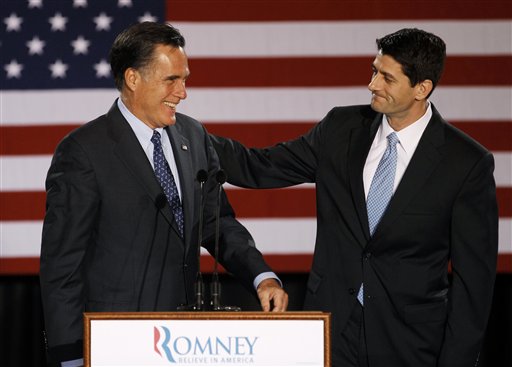NORFOLK, Va. – Mitt Romney has selected Rep. Paul Ryan of Wisconsin as his vice-presidential running mate, introducing the seven-term congressman and architect of Republicans’ budget-cutting plans at a spirited rally on the deck of a battleship here Saturday.
In shirtsleeves and tie, Romney promised that he and Ryan would restore the American economy by cutting deficits and growing jobs. He called Ryan a man of integrity and character rooted in his middle-class Midwestern upbringing and said he had chosen a candidate with a vision for addressing the nation’s fiscal problems.
“He’s never been content to simply curse the darkness,” Romney said of Ryan. “He’d rather light candles.”
Romney said that he and Ryan will travel the country offering a campaign focused on “American aspirations and American ideals.”
Bounding to the deck of the USS Wisconsin — a not-so-subtle nod to Ryan’s home state — Ryan used his introduction on the national stage to praise Romney as a “man for this moment,” a leader capable of resetting the economy.
“Mitt Romney is a leader with the skills, the background and the character that our country needs at a crucial time in its history. Following four years of failed leadership, the hopes of our country, which have inspired the world, are growing dim, and they need someone to revive them,” he said. “Gov. Romney is the man for this moment, and he and I share one commitment: We will restore the dreams and greatness of this country.”
By selecting Ryan, Romney has made a potentially bold but risky move to reset the dynamics of the presidential election.
He has chosen the intellectual heart of the Republican Party’s movement to slash deficits and signaled a desire to place the nation’s looming fiscal challenges at the center of the campaign’s final months.
But Ryan’s proposal to overhaul Medicare has already become a favorite target for Democrats, who charge that it would essentially end the popular retiree program and shred the social safety net.
Reacting to the pick, Jim Messina, campaign manager for President Obama’s re-election effort, called Ryan’s budget proposals “radical” and said they would ensure “budget-busting tax cuts for the wealthy, while placing greater burdens on the middle class and seniors.”
Elevated to chairman of the Budget Committee with the Republican takeover of the House in the 2010 midterm elections, Ryan authored a budget proposal that called for reducing deficits to their lowest levels in decades by dramatically shrinking spending.
Notably, the plan called for reshaping Medicare into a government payment that would allow seniors to purchase private insurance, an attempt to curb the rising costs of the entitlement program.
That idea will now play a key role in critical swing states with large retiree populations, most notably Florida, where Romney and Ryan are scheduled to campaign Monday.
The choice will likely energize a GOP base that sought a campaign with a clear vision for the country and not focused exclusively on criticizing Obama. In Norfolk, a crowd of more than 1,500 lustily cheered nearly every line of his short address, responding with more obvious enthusiasm to Ryan than to the man who chose him.
But Democrats have savored the chance to place Ryan’s prescription for deficit reduction at the heart of the presidential election, believing details of the plan will convince voters that Democrats offer a fairer path to reduced deficits through a combination of spending cuts and higher taxes on the wealthy.
“As a member of Congress, Ryan rubber-stamped the reckless Bush economic policies that exploded our deficit and crashed our economy. Now the Romney-Ryan ticket would take us back by repeating the same, catastrophic mistakes,” Messina said.
While Romney’s selection does not replicate the surprise jolt of Arizona Sen. John McCain’s choice of Alaska Gov. Sarah Palin four years ago, Ryan is nonetheless a splashier choice than several other contenders who had been considered safer options.
Two who were high on Romney’s short list of VP contenders — former Minnesota Gov. Tim Pawlenty and Ohio Sen. Rob Portman — were informed in recent days that they would not be on the ticket, according to two Republican sources. Both were scheduled for other events Saturday.
Romney made the decision to choose Ryan on Aug. 1, the day he returned to the United States from his foreign tour, according to a campaign aide.
With the selection of Ryan, Romney offers voters the starkest possible choice on how to address issues of spending and taxing, embracing Ryan’s single-minded focus on reducing the nation’s debt without raising taxes.
David Winston, a pollster who has advised House Republicans, said the pick ensures that a Romney win would represent more than just a referendum on Obama and would hand the new Republican president a governing mandate.
“If you win by a good margin, and it’s clear what you were running on, then you come into the presidency with an ability to implement those policies,” he said.
Rep. Chris Van Hollen, D-Md., the ranking Democrat on the House Budget Committee, said the choice “will clearly sharpen the issues.”
“Elections are about the future direction of the country, and this choice demonstrates that Mitt Romney is doubling down on an economic agenda that benefits people like Mitt Romney at the expense of the rest of the country,” he said.
Ryan’s “Path to Prosperity,” versions of which were adopted by the GOP House in 2011 and 2012, calls for balancing the budget by 2040 through deep cuts to virtually every social program, from Medicaid to food stamps to Pell Grants.
Ryan has proposed raising the Medicare eligibility age to 67 and capping spending on those who turn 65 after 2023. In the future, seniors would be offered a set amount with which to purchase private health insurance on newly created federal exchanges.
To Ryan, the plan represented a forthright response to a predictable crisis of mounting debt. Only by addressing entitlement programs, he argued, could deficits be curbed.
Democrats charge that the plan would essentially end Medicare by turning it into a voucher program. Ryan counters it would save the popular program by altering its unsustainable growth rate.
Ryan’s views on budgets have been consistent in recent years. For many voters unfamiliar with the budget debate, however, Ryan will probably start out as an unknown. According to recent polls, reviews of Ryan tilt positive in Wisconsin and nationally, but not overwhelmingly so.
And large numbers, even in his home state, don’t know enough about him to rate him favorably or unfavorably. In a CNN poll this week, Florida’s Sen. Marco Rubio was the top pick for No. 2 among Republicans and GOP-leaning independents, followed by Ryan and New Jersey Gov. Chris Christie tied at 16 percent.
A 42-year-old ice fishing and fitness enthusiast, Ryan could use his boyish charm to offer digs at Obama not weighted with negativity, although he has had a tense relationship with the president. Not long after Ryan unveiled his budget framework in 2011, Obama invited the congressman to attend what the White House billed as a major economic address at George Washington University.
Obama proceeded to shock Ryan by eviscerating his plan while the congressman sat silently in the front row. “I believe it paints a vision of our future that’s deeply pessimistic,” Obama said. He said there was “nothing serious” about reducing the deficit while cutting taxes for millionaires and billionaires and nothing “courageous” about asking for sacrifices only from those who cannot afford them.
But Ryan has appeared to develop a considerable rapport with Romney in recent months. While Romney had spent considerable time campaigning alongside each of the men considered top contenders, he seemed to particularly enjoy sharing a stage with Ryan during five full days the two men spent campaigning together leading up to the Wisconsin Republican primary in April.
At the time, Romney chief strategist Stuart Stevens acknowledged that the two got along particularly well behind the scenes and noted their “chemistry” in public appearances.
Ryan’s blue-collar roots could also serve as a useful contrast to Romney’s background of privilege.
Ryan survived on Social Security benefits as a teenager after his father died of a heart attack. He later worked at a McDonald’s and for a time drove an Oscar Meyer hot dog car.
Send questions/comments to the editors.




Comments are no longer available on this story